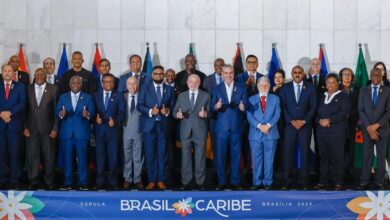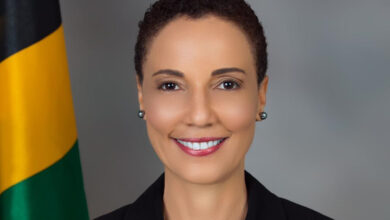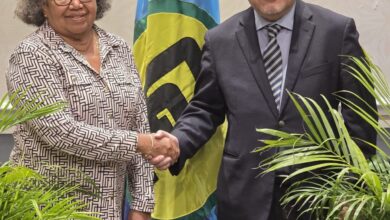(CARICOM Secretariat, Turkeyen, Georgetown, Guyana) – A commitment to a transitional governance arrangement in Haiti and the resignation of interim Prime Minister Ariel Henry were among the major outcomes, as CARICOM, international partners, and Haitian stakeholders concluded a High-Level Meeting on Haiti late Monday [11 March 2024] evening in New Kingston, Jamaica.
Chairman of CARICOM, H.E. Dr Mohamed Irfaan Ali briefed the media following the talks and announced that agreements had been reached. They include the pact for a peaceful transition of power, continuity of governance, an action plan for near-term security and the road to free and fair elections.
The agreement seeks to ensure that “Haiti will be governed by the rule of law,” President Ali stated.
“This commitment reflects hard compromises among a diverse coalition of actors who have put their country above all differences,” he added.
Acknowledging the resignation of interim Prime Minister Henry “upon the establishment of a Transitional Presidential Council and the naming of an interim prime minister,” he thanked the outgoing Prime Minister for his service to the people of Haiti and his personal commitment to the development of his country.
A statement read by President Ali outlined the details of the Transitional Presidential Council comprising seven voting members and two non-voting observers. The seven voting members will comprise one representative from each of the following groups: Collectif, December 21, EDE/RED/Compris Historique, Lavalas, Montana, Pitit Desalin, and the private sector. The non-voting members will be represented by one member from civil society and one member of the Inter-Faith community.
The Council will exercise specified presidential authorities during the transition, operating by majority vote. Anyone who is on a charge, indictment or has been convicted in any jurisdiction, who is under UN sanction, who intends to run in the next election in Haiti and who opposes the UN Security Council Resolution 2699, is excluded from the Council.
According to the Statement, the Transitional Presidential Council will swiftly select and appoint an Interim Prime Minister, and together with the interim leader, appoint an inclusive Council of Ministers.
President Ali said the Transitional Presidential Council will hold the relevant and possible powers of the Haitian presidency during the transition period, until an elected government is established.
The Council will also appoint an inclusive Council of Ministers. The agreed responsibilities are articulated in the Outcome Declaration of CARICOM, International Partners and Haitian Stakeholders, issued at the conclusion of the talks in Jamaica.
The CARICOM Chair said it is agreed that implementation of these measures will be conducted in parallel. The parties will also make specific individual commitments regarding principles of inclusion, integrity, restoration of peace, and an orderly transition of power.
President Ali also noted that these shared and individual commitments can represent important steps towards facilitating increased humanitarian access to help ease the suffering of the Haitian people.
He said that the international community stands ready to partner with Haiti to achieve these goals.
The CARICOM Chair said that Haitian participants must now fully implement their commitments, adding that the people of Haiti “deserve a country where children can go to school, and their parents know they will be safe.”
He commended the “willingness and courage” of the Haitian stakeholders, and lauded their commitment “to put Haiti back on a path towards democracy, stability, and prosperity.” This, the Chair said, was within the framework now in place, which outlines a path forward.
Imploring all involved in helping Haiti move forward to be patient with the process toward peace and stability, he said that the agreement was just the first step in several steps ahead.
“This process requires patience, let us be patient. Let us give a bit, let us sacrifice a bit and give this agreement a chance to work — to enter a process of national dialogue and to lay the groundwork for a transition that is based on inclusivity encourages participation by all stakeholders and paves the way for elections as soon as possible. This is the only sustainable path, the future of strong democratic institutions, peaceful resolution of conflict and security and prosperity of all Haitians,” the CARICOM Chair affirmed.






